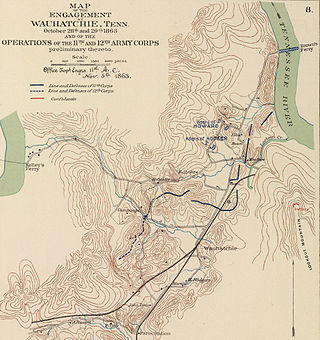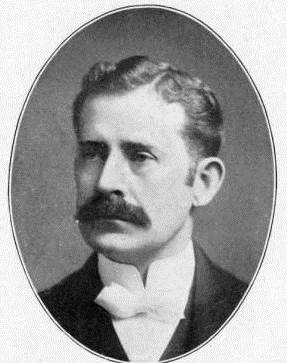
Chattanooga is a city in and the county seat of Hamilton County, Tennessee, United States. Located along the Tennessee River bordering Georgia, it also extends into Marion County on its western end. With a population of 181,099 in 2020, it is Tennessee's fourth-largest city and one of the two principal cities of East Tennessee, along with Knoxville. It anchors the Chattanooga metropolitan area, Tennessee's fourth-largest metropolitan statistical area, as well as a larger three-state area that includes Southeast Tennessee, Northwest Georgia, and Northeast Alabama.

Lookout Mountain is a mountain ridge located at the northwest corner of the U.S. state of Georgia, the northeast corner of Alabama, and along the southeastern Tennessee state line in Chattanooga. Lookout Mountain was the scene of the 18th-century "Last Battle of the Cherokees" in this area during the Nickajack Expedition. On November 24, 1863, during the American Civil War, the Battle of Lookout Mountain took place here.

The Battle of Missionary Ridge was fought on November 25, 1863, as part of the Chattanooga Campaign of the American Civil War. Following the Union victory in the Battle of Lookout Mountain on November 24, Union forces in the Military Division of the Mississippi under Maj. Gen. Ulysses S. Grant assaulted Missionary Ridge and defeated the Confederate Army of Tennessee, commanded by Gen. Braxton Bragg, forcing it to retreat to Georgia.

The Chattanooga Area Regional Transportation Authority (CARTA) is the mass transit provider for Chattanooga, Tennessee and its vicinity.

The Great Locomotive Chase was a military raid that occurred April 12, 1862, in northern Georgia during the American Civil War. Volunteers from the Union Army, led by civilian scout James J. Andrews, commandeered a train, The General, and took it northward toward Chattanooga, Tennessee, doing as much damage as possible to the vital Western and Atlantic Railroad (W&A) line from Atlanta to Chattanooga as they went. They were pursued by Confederate forces at first on foot, and later on a succession of locomotives, including The Texas, for 87 miles (140 km).

The Tennessee Valley Railroad Museum is a railroad museum and heritage railroad in Chattanooga, Tennessee.

The Battle of Wauhatchie was fought October 28–29, 1863, in Hamilton and Marion counties, Tennessee, and Dade County, Georgia, in the American Civil War. A Union force had seized Brown's Ferry on the Tennessee River, opening a supply line to the Union army in Chattanooga. Confederate forces attempted to dislodge the Union force defending the ferry and again close this supply line but were defeated. Wauhatchie was one of the few night battles of the Civil War.
The Battle of Davis's Cross Roads, was fought September 10–11, 1863, in northwestern Georgia, as part of the Chickamauga Campaign of the American Civil War. It was more of a series of maneuvers and skirmishes than an actual battle and casualties were negligible.

The St. Elmo Historic District, or St. Elmo for short, is a neighborhood in the city of Chattanooga, Tennessee. It is situated in the southernmost part of Hamilton County within the valley of Lookout Mountain below the part of the Tennessee River known as Moccasin Bend. St Elmo is at the crossroads of two ancient Indian trails, and was first occupied by Native American hunters and gatherers in the Woodland period, then agricultural Mississippians, including Euchee and Muscogee, and for a brief period between 1776 and 1786, the Cherokees in a community called Lookout Town. St. Elmo became part of the city of Chattanooga when it was annexed in September 1929.

The Battle of Ringgold Gap was fought November 27, 1863, outside the town of Ringgold, Georgia, by the Confederate and Union armies during the American Civil War. Part of the Chattanooga Campaign, it followed a heavy Confederate loss at the Battle of Missionary Ridge from which General Braxton Bragg's artillery and wagon trains were forced to retreat south. The five hour Battle of Ringgold Gap resulted in the Confederate victory of Major General Patrick R. Cleburne and gave the Army of Tennessee safe passage to retreat through the Ringgold Gap mountain pass.
Miller's Department Store was a chain of department stores based in East Tennessee.

The First Presbyterian Church in Chattanooga, Tennessee, located at 554 McCallie Avenue, is a historic, downtown congregation of the Presbyterian Church in America (PCA) and the first Christian congregation founded in Chattanooga.

Reuben Harrison Hunt, also known as R. H. Hunt, was an American architect who spent most of his life in Chattanooga, Tennessee. He is considered to have been one of the city's most significant early architects. He also designed major public building projects in other states. He was a principal of the R.H. Hunt and Co. firm.

The Chattanooga–Cleveland–Dalton, TN–GA Combined Statistical Area covers a total of thirteen counties – seven in southeast Tennessee, six in northwest Georgia. The combined statistical area consists of three metropolitan statistical areas – Chattanooga, Cleveland, and Dalton – as well as the Athens, Dayton, and Calhoun micropolitan statistical areas. At the 2010 census, the CSA had a population of 1,010,000.

Whiteside is an unincorporated community in Marion County, Tennessee. It was originally settled as a Cherokee town in the late eighteenth century.

The Chattanooga campaign was a series of maneuvers and battles in October and November 1863, during the American Civil War. Following the defeat of Maj. Gen. William S. Rosecrans's Union Army of the Cumberland at the Battle of Chickamauga in September, the Confederate Army of Tennessee under Gen. Braxton Bragg besieged Rosecrans and his men by occupying key high terrain around Chattanooga, Tennessee. Maj. Gen. Ulysses S. Grant was given command of Union forces in the West, now consolidated under the Division of the Mississippi. Significant reinforcements also began to arrive with him in Chattanooga from Mississippi and the Eastern Theater. On October 18, Grant removed Rosecrans from command of the Army of the Cumberland and replaced him with Major General George Henry Thomas.

The Brainerd Mission was a Christian mission to the Cherokee in present-day Chattanooga, Tennessee. The associated Brainerd Mission Cemetery is the only part that remains, and is listed on the National Register of Historic Places.
White Oak Mountain is a mountain located in northwestern Georgia and southeastern Tennessee. The mountain is part of the Ridge and Valley Appalachians.
Chattanooga, Tennessee, was a major rail center and a strategic vantage-point, with high ground competed-for by both sides. When Union forces were besieged in the town, General Ulysses S. Grant forced a supply-route, earning him Lincoln's particular gratitude.
















